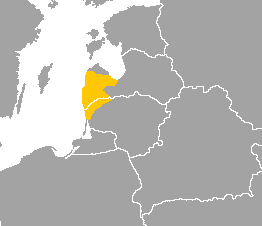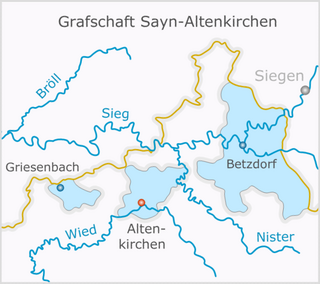Related Research Articles

The Curonian language, or Old Curonian, is a nearly unattested Baltic extinct language spoken by the Curonians, a Baltic tribe who inhabited the Courland Peninsula and the nearby Baltic shore. Curonian was a Baltic language; some scholars consider it to have been an Eastern Baltic, intermediate between Lithuanian and Latvian, while others like Vytautas Mažiulis classify it as Western Baltic. Linguist Eduard Vääri argues that it is possible that Curonians were Baltic Finns. The attested local Finnic language, Livonian, may be the source of Finnic elements in Curonian. In 1912 Latvian linguist Jānis Endzelīns finally proved that Curonian was a Baltic language; according to him, Curonian by its qualities was in between Lithuanian and Latvian languages.

Woltervon Plettenberg was the Master (Landmeister) of the Livonian Order from 1494 to 1535 and one of the greatest leaders of the Teutonic knights. He was an important early Baltic German.

Sayn-Wittgenstein-Sayn-Altenkirchen was a German county located in what is now Rhineland-Palatinate, near the river Sieg.
Jūratė Kiaupienė is a Lithuanian historian, professor, Habilitated Doctor.

Rudolf Simek is an Austrian philologist and religious studies scholar who is Professor and Chair of Ancient German and Nordic Studies at the University of Bonn. Simek specializes in Germanic studies, and is the author of several notable works on Germanic religion and mythology, Germanic peoples, Vikings, Old Norse literature, and the culture of Medieval Europe.

The War of the Lüneburg Succession was a conflict over the succession to the Principality of Lüneburg that broke out in 1370 in north Germany and lasted, with interruptions, for 18 years. After William II of Lüneburg died without male heirs in 1369, the "Older House of Lüneburg" was extinguished. According to the inheritance rules of the House of Welf to which William belonged, the Duke of Brunswick, Magnus II Torquatus, was entitled to succeed. However, Charles IV ruled that this Imperial Fief should be returned to the Empire and enfeoffed Albert of Saxe-Wittenberg and his uncle, Wenceslas with the Principality, thereby triggering the war.

The Eilenriede is a 640-hectare (1,600-acre) municipal forest in Hannover, Germany. It is the largest urban city forest in Germany, and also one of the largest in Europe. The Eilenriede is nearly twice the size of Central Park. The biggest German urban "park" in the strict sense of the word, however, is the Englischer Garten München, with "only" 375-hectare (930-acre).
Gottfried III of Raabs was Burgrave of the medieval Burgraviate of Nuremberg from around 1146 until his death.
Gottfried II of Raabs was Burgrave of the medieval Burgraviate of Nuremberg, jointly with his brother Conrad I, from 1105 until his death.

Michael Matheus is a German historian.
Horst Wolfgang Böhme is a German archaeologist with a focus on Late Antiquity / Early Middle Ages and research into castles.

Ludegast was bishop of Mainz in the early 7th century, succeeding Siegbert I. The Latinized name Leudegasius may be of East Germanic origin. He seems to have been a Burgundian. The period of his episcopate can only be roughly classified into the time around 610.
Heinrich Appelt was an Austrian historian.

Helene von Engelhardt was a Baltic German poet, writer and translator.

The County of Moers was a historical princely territory on the left bank of the Lower Rhine that included the towns of Moers and Krefeld as well as the surrounding villages and regions.
Helmut Glück is a German linguist.
Franz Herre is a German biographer, historian and journalist.
Peter Ludwig Gülke is a German conductor and musicologist.
Peter Herde is a German historian. His research activities range from fundamental work on papal diplomacy of the Middle Ages to the history of the country up to the Second World War.
Annegret Rosenmüller is a German musicologist.